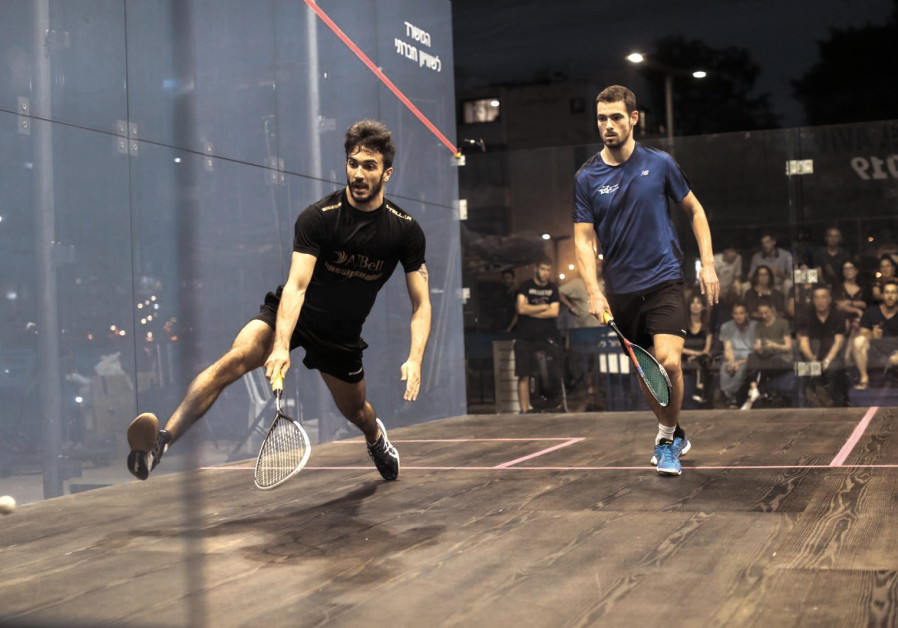
The British installed squash courts at their army bases. When the State of Israel was declared, they became part of the air force and the pilots became the Jewish state's first squash players.
If you’re walking around Habima Square in Tel Aviv this weekend, you may notice a glass box that fits right into the Tel Aviv landscape.
If you look a bit closer at the cube you’ll see two people swinging rackets and hitting a ball at high speeds. Over the course of the week, Israel is hosting the Migdal Insurance Professional Squash Association 11K Tel Aviv 2019 Challenger Tour, which will culminate with the final on Saturday night.
Arik Kaplan, the President of Ayelet, The Federation of Non-Olympic Competitive Sports in Israel, is thrilled to be able to host the world-class squash competition in Israel.
“Squash is one of the most successful sports in the world and requires a variety of athletic abilities,” said Kaplan. “We welcome the initiative that is being made by the squash association by making the sport accessible with the special glass court which will allow the sport to reach new audiences.”
The event is also recognizing those who are physically challenged and will include a number of exhibitions including the three-time Israeli women’s champion Roni Kesten, who has competed at the highest levels with cerebral palsy.
The tournament itself features over 20 players from around the world plus a number of top-ranked Israelis who will all battle it out for supremacy outdoors smack dab in the middle of one of the trendiest areas of the city.
Squash has steadily grown in popularity in Israel and this is one more step towards attracting many new fans and players.
Aviv Bushinsky, the chairman of the Israel Squash Association exclusively spoke to The Jerusalem Post about how the sport has been gaining momentum over the years.
“When we first hosted a squash tournament we did it at a Tel Aviv shopping mall and then we held it in Jerusalem by the Jaffa Gate in the Old City,” noted Bushinsky. “This time when we thought of placing the glass squash court in Habima Square the municipality thought we were crazy and they decided against it. However, Tel Aviv Mayor Ron Huldai overrode the decision and here we are bringing the community and sport together at one of the most popular places in the city.”
The tournament is a realization of a longtime dream for Bushinsky.
“It’s a dream come true to have this tournament. I wanted to buy a glass court which would be portable, and when I saw this exact thing near the pyramids in Giza, EgyptI said why can’t we do it.
Squash in Israel has an interesting history.
“When the British controlled the country they installed squash courts inside of their army bases,” explained Businsky. “Later on, when they were handed over to the Israel Air Force, the soldiers saw the courts and began playing the game. In essence the first Israeli squash players were pilots.”
One of the great parts of the squash competition is that it will also recognize people who are physically challenged. Kesten, 25, is a shining example of a true role model for many youngsters across the country.
“Due to my challenging situation, at the age of seven it was decided that I had to play a sport,” said Kesten. “I had a choice of many, whether it was soccer, basketball or even ping-pong. I saw that there was a sport called squash, however I had no idea of what it actually was. I registered to see what it was like and the rest is history. When I was 16, won the Israel under-19 championship and I’ve competed in three Maccabiahs as well as the European Championships. Today, I am ranked third among all women in Israel.”
Bushinsky sees squash as an ideal sport for Israeli athletes.
“Squash is almost identical the most popular sport in Israel, matkot, the paddle game that is played on the beaches. In squash you can hit the ball like matkot, the ball is the same size as that of matkot and you can use the same intensity and aggressiveness as you do in matkot. Squash is a perfect fit for a Sabra.”








 Day three of the 2019 Allam British Open takes place today as the oldest tournament in squash continues at the newly renamed Allam Sport Centre.
Day three of the 2019 Allam British Open takes place today as the oldest tournament in squash continues at the newly renamed Allam Sport Centre.
.jpg?)



 English No.1 Sarah-Jane Perry has said next week’s inaugural Manchester Open is a big step forward for women’s squash.
English No.1 Sarah-Jane Perry has said next week’s inaugural Manchester Open is a big step forward for women’s squash. National squash player Nafiizwan Adnan (pic) has called time on his career after bowing out in the quarter-finals of the Asian Individual Championships.
National squash player Nafiizwan Adnan (pic) has called time on his career after bowing out in the quarter-finals of the Asian Individual Championships.

